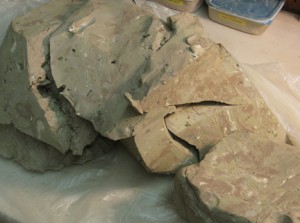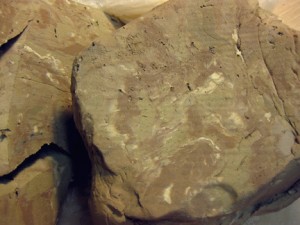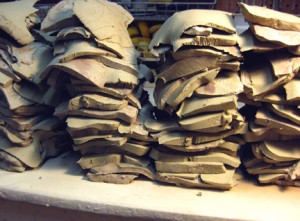Oh, what to do with all those dry clay scraps?…
Well, turn them back into new clay again of course!!!
Yep, all of those dried trimming scraps can be re-hydrated into new clay
and used again to make a new pot!
So I take all of my trimming scraps and allow them to dry out completely.
I keep them in a large plastic bin for “safe keeping.” When there’s a good amount
of them, I fill the container with water just above the clay level. The water will soak
into the dry clay and allow it to “slake” down. After the clay has absorbed the water,
I let it sit for weeks… or at least until I feel I have time to deal with it.
When I feel that the dried clay is rehydrated, and the majority of the water has either
soaked in or dehydrated, I scoop out handfuls of the new clay mixture and place it on
a large slab of plaster. This will help draw the excess water out of the mixture. I typically
leave the pile of clay sitting on the plaster bat for a few days until enough moisture has
been drawn out and the mixture is now close to a normal clay consistency. Then, I take
the clay off the plaster bat and get ready for some “heavy lifting.”


As you can see, I don’t worry too much about what kind of clay scraps get into my reclaim.
In fact, some of my other studio mates don’t reclaim their scraps… so them give them to me!
You just need to make sure that all clay going into your reclaim bin is rated for the same
kiln firing temperature.
I then take slices of the new clay, and interleave them with layers of fresh clay straight out
of the box. As the majority of my work is fired in the soda kiln, I generally use fresh
soda clay when I’m layering so that I know that at least half of it is for the soda kiln.

Now that I have stacks of mixed clays, I start pounding them together. It’s actually
easier than it sounds. Just pick up the entire stack, and slam it back down onto the
table. Cut it in half, stack the halves on each other – and slam it down again.
Slice-stack-slam-repeat. Slice-stack-slam-repeat. And so on… and so on…

Seen above, I’ve only sliced, stacked & slammed once. See the layers are still apparent?
Assume you are starting out with 10 layers. Slam them down, cut it in half, stack it on itself…
now you have 20 layers. Repeat… and now you have 40 layers. Repeat… and now you have
80 layers. Then 160 layers… 320 layers… 640 layers… etc. So the more times you do it,
the thinner the layers become and the more incorporated your different layers become.
Once I have sliced & slammed the clay and feel that they clay is well incorporated, I pound
roughly into cubes and store it in recycled clay bags. This reclaimed clay is now ready to go!
Yesterday, I reclaimed over 175 pounds of recycled clay – that would have otherwise been
thrown away. Even better… with just a little effort, it’s like FREE CLAY !!!